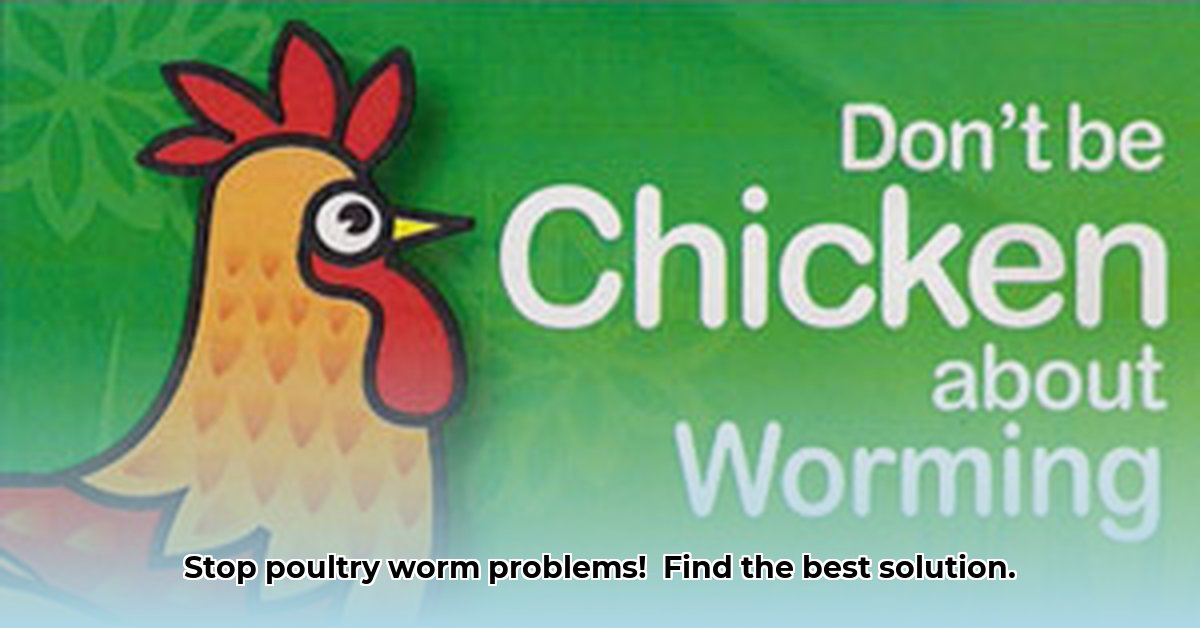
Keeping your chickens healthy and productive requires a proactive approach to parasite control. This guide provides a comprehensive, practical approach to sustainable poultry deworming, focusing on effective strategies and Tractor Supply products that support these practices. We'll explore various methods, their pros and cons, and a step-by-step plan for implementing a successful deworming program. For additional wormer options, check out Tractor Supply options.
Understanding Poultry Parasites: The Enemy Within
Internal and external parasites, such as intestinal worms (roundworms, tapeworms, etc.) and mites, significantly impact chicken health. Infestations lead to reduced egg production, weight loss, and potentially, death. Early detection and effective treatment are crucial for maintaining a healthy flock. But simply reaching for the first chicken wormer isn't always the best approach.
Sustainable Deworming: A Holistic Approach
Over-reliance on chemical dewormers presents several drawbacks. Parasites can develop resistance, rendering treatments ineffective over time. Furthermore, chemical dewormers can have negative environmental impacts. A sustainable strategy integrates several key elements:
- Hygiene: Maintaining a clean coop and run is paramount. Regular cleaning, disinfection, and manure removal significantly reduce parasite prevalence. Think of it as preventative maintenance for your poultry's home.
- Pasture Rotation (Where Applicable): If you have access to pasture, rotating your chickens to fresh areas minimizes parasite buildup in a single location. This gives the land a chance to naturally recover.
- Integrated Pest Management (IPM): IPM is a proactive strategy that combines prevention, monitoring, and targeted treatment only when necessary. It minimizes the use of chemical dewormers while maximizing long-term results.
- Natural Deworming Options: Several natural options can augment your deworming strategy. These products, available at Tractor Supply and other retailers, may be less effective than chemical wormers for severe infestations but are a valuable tool for prevention and managing milder cases. These might include herbal remedies or diatomaceous earth.
Selecting the Right Dewormer at Tractor Supply: Key Considerations
Choosing the right product requires careful consideration:
- Parasite Identification: Different dewormers target specific parasites. Accurate identification is crucial; mismatched treatment is ineffective.
- Product Ingredients: Opt for products with natural or organically approved ingredients whenever possible and with minimal potential side effects. Always read the label carefully.
- Ease of Use: Select a product and application method that fits your flock size and farming routine. A complicated process might lead to inconsistent deworming.
- Cost-Effectiveness: Consider the long-term implications. While natural alternatives may have a higher initial cost, they can prevent larger problems in the future, potentially saving money over time.
Chemical vs. Natural Dewormers: A Comparison
This table summarizes the key differences:
| Feature | Chemical Dewormers | Natural Dewormers |
|---|---|---|
| Efficacy | Generally highly effective and fast-acting | Less effective against severe infestations; efficacy depends on specific product and parasite. |
| Environmental Impact | Potential negative impacts; requires careful management | Generally lower impact, more environmentally friendly. |
| Cost | Lower initial cost | Potentially higher initial cost, but could lower long-term expenses through prevention |
| Potential Side Effects | Possible toxicity and risk of parasite resistance. | Typically fewer side effects; lower resistance risk. |
Your Sustainable Deworming Action Plan: A Step-by-Step Guide
- Monitor Your Flock: Regularly check your chickens for signs of infestation (lethargy, unusual droppings, etc.). Early detection is key.
- Accurate Diagnosis: If you suspect an infestation, identify the specific parasite. Consult your veterinarian for diagnosis and guidance.
- Choose the Right Dewormer: Select a chicken wormer based on the identified parasite, considering both chemical and natural options available at Tractor Supply.
- Follow Instructions Carefully: Adhere strictly to the product label instructions. Incorrect dosage or administration can be ineffective or harmful.
- Observe Your Flock: Monitor your chickens for signs of improvement or adverse reactions after treatment.
- Preventative Measures: Continue implementing good hygiene practices, pasture rotation (where applicable), and other preventative measures outlined above. This long-term strategy keeps parasite numbers down.
By thoughtfully integrating these strategies and choices, you create a sustainable deworming program that effectively protects your flock while minimizing environmental impact. Remember, consistent vigilance and proactive measures are your best defense against poultry parasites. Consult with your veterinarian for personalized advice and guidance.